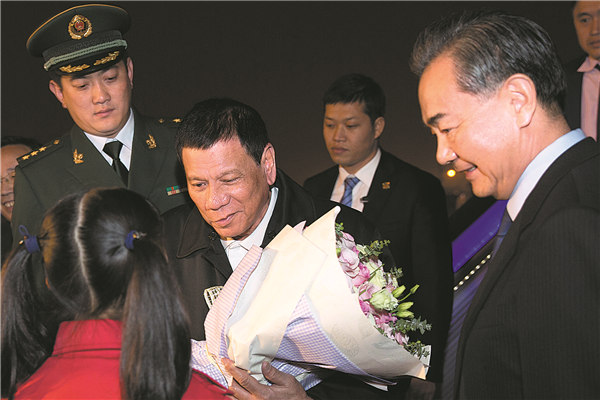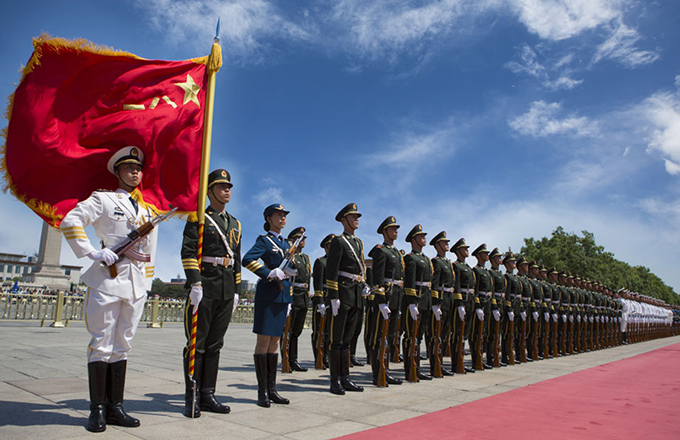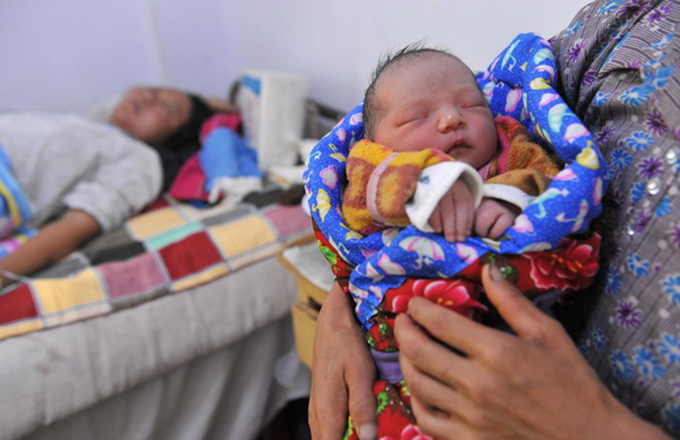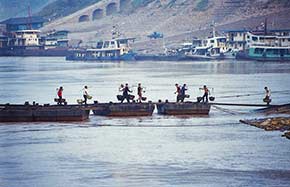Beijing-Manila rapport sets inspiring example
 |
|
Philippine President Rodrigo Duterte, accompanied by Foreign Minister Wang Yi, is greeted at Beijing Capital International Airport at the start of his fourday state visit on Oct 18, 2016. HE XIAOHUI / FOR CHINA DAILY |
There may be no better example of the Chinese diplomatic saying "Harmony benefits both, while confrontation hurts" than the China-Philippines relationship.
Just a year ago, when Benigno Aquino III was the Philippine leader, Beijing and Manila were locked in confrontation following the South China Sea arbitration unilaterally initiated by the Philippines.
Who at that time could have anticipated the "all-round reversal" in the two countries' relationship hailed by visiting Chinese Foreign Minister Wang Yi in Manila on Tuesday?
As Wang remarked, in a little more than six months, exchanges in "all fields have been restored in an all-round manner".
And the rapport is not just rhetoric. Judging from Wang's exchanges with Philippine President Rodrigo Duterte as well as his Philippine counterpart, Foreign Affairs Secretary Alan Peter Cayetano, it looks likely Beijing and Manila may start serious talks about a 1986 agreement between then Chinese leader Deng Xiaoping and Philippine Vice-President Salvador Laurel for the two countries to jointly exploit resources in the South China Sea.
If that step is finally taken, it will not only be the realization of the 31-year-old proposal, it will also be an inspiring example for all claimant countries of how to handle their disputes in the South China Sea.
As Wang said, shelving disputes and engaging in collaboration is a far better option than taking unilateral actions and becoming stranded in damaging confrontation.
In sharp contrast to when Aquino III was president and the tense standoff he sparked froze trade ties, Duterte's diplomatic pragmatism is laying a solid foundation for constructive ties, which will surely result in tangible rewards.
The Chinese foreign minister is now referring to Manila as "an indispensable, important partner" for building the 21st Century Maritime Silk Road, stating the Belt and Road will be a highlight of their next-step cooperation. The initiative's heavy input in interconnectivity may be a tremendous boost for the infrastructure-hungry Philippine economy.
Vowing China will be "the most sincere and enduring partner" of the Philippines for its national development, Wang also promised strong Chinese support for the latter in domestic and international affairs, including its crusade against drugs and terrorism.
The dramatic reversal in the China-Philippine relationship has proved Beijing's proclaimed belief that the claimants in the South China Sea disputes are fully capable of handling their disagreements on their own. Yet attempts by third parties to muddy the waters have never stopped. And it may not be realistic to expect those claimant countries to demonstrate solidarity in the face of powerful outsider intervention and say no to it.
Manila's rapport with Beijing, however, will certainly be conducive to managing the other unresolved disputes in the waters.

























